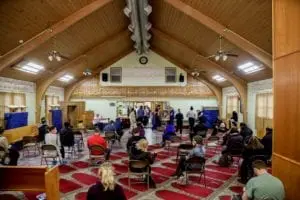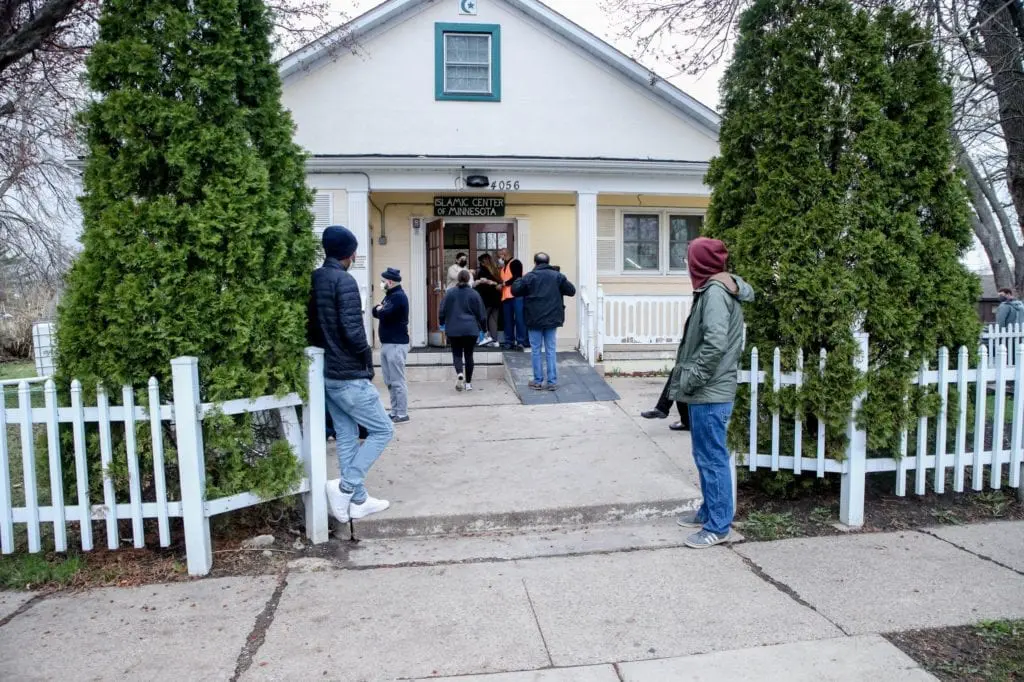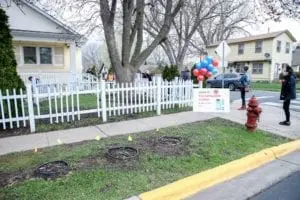PBPH Students Advance Equity with Vaccine Clinics

Monday also marked the beginning of Ramadan, a holy month of spiritual reflection, fasting, and celebration with family and friends. This added urgency to the vaccination efforts, in hopes of giving Muslim community members peace of mind to gather safely.
“As a community, like the whole world, we’re all experiencing a collective trauma with this pandemic,” explained Rebecca. “We’re all elevated into fight or flight mode. So to be able to gather with family in a safe way can help alleviate and reduce that stress.”

With a week and a half notice, they found out that another Muslim organization received a sizable allotment of Johnson & Johnson vaccines. Working closely with other volunteers from the clinic, Hassan worked to fill the appointments and sort through the logistical challenges of vaccinating hundreds of people in a short amount of time.
“The demand for vaccines is still greater than the supply. So it’s easy to get 200 doses distributed. That’s not a problem,” said Hassan. “But we wanted to do it in a way that addressed some of the equity problems that we’ve been seeing in the distribution of the vaccine. So we started to work very hard on getting the word out with members of the Islamic Center of Minnesota and other mosques.”
The night before the event, they found out they had 100 more doses to distribute, adding pressure both to Hassan in his work getting people scheduled, and Rebecca, who he brought in to help with day-of operations at the clinic.
Rebecca has been volunteering at different vaccine clinics over the last few months, and was up to the challenge of helping vaccinate nearly 300 people in less than 3 hours. The PBPH community at NWHSU was also excited to jump in and help.
“In the Northwestern post-bac program, it’s a very tight knit community. We all support each other. It’s one of the most amazing things I’ve experienced being a part of this community,” said Rebecca.
Together with two nurses and one pharmacist, volunteers from the clinic and NWSHU worked to greet and register patients, keep everyone moving smoothly, and monitor patients after they received the vaccine. “The volunteers from the clinic and NWHSU worked together hand-in-hand to make the day successful,” said Hassan.
“We had a diverse group of volunteers serving a diverse group of patients, and it was just really beautiful to watch,” said Rebecca. “It was really one of the most well-run clinics I’ve seen.”
Beyond the incredible organization of the day, what made this clinic special was the community environment. “I saw a lot of greetings between familiar faces. Folks coming in who are members of the mosque but probably haven’t seen each other in a really long time,” said Rebecca. “There was a real sense of community throughout the entire day.”
“We accommodated every single person,” said Hassan. “We kept the nurses on hold because we got a call from someone on her way. They were getting ready to pack up, but we were like, ‘just wait, they’re on their way.’ And so we accommodated her.”

“It’s been a real learning experience. This is what it looks like to address inequity on the ground, right?” shared Rebecca.
“This is a systemic problem that requires a systemic solution. But as we wait on our politicians, these are the things that we can do to ensure that patients are getting what they need within their communities. These are patients that don’t have the resources to stay on the internet at two in the morning to secure a vaccine slot three hours away and make it there twice.
We have to meet the patients where they are. And the fact that we’ve struggled with getting the second clinic filled, it just highlights that this work is hard, but we have to be intentional about it, and we have to do it. I’m so grateful to have a friend like Hassan in this world, who’s doing this work.”
 “We had a diverse group of volunteers serving a diverse group of patients, and it was just really beautiful to watch,” said Rebecca. “It was really one of the most well-run clinics I’ve seen.”
“We had a diverse group of volunteers serving a diverse group of patients, and it was just really beautiful to watch,” said Rebecca. “It was really one of the most well-run clinics I’ve seen.”